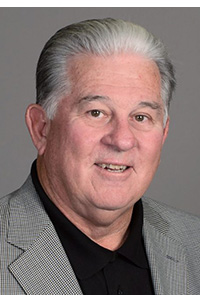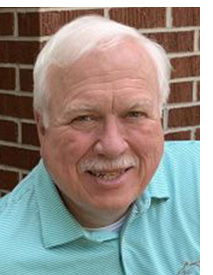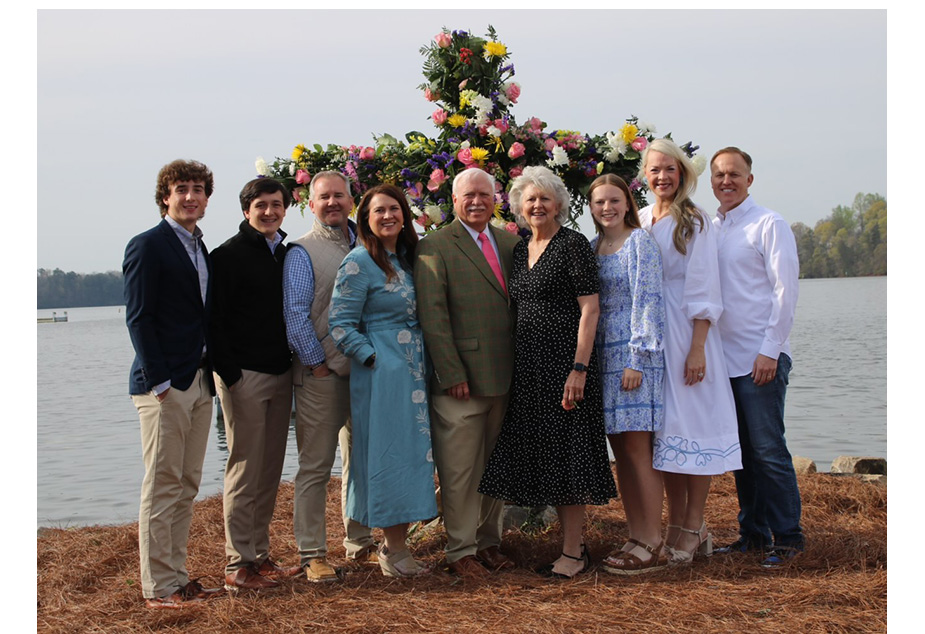By Chris Moon
What does it take to pastor a church for the long haul?
Not just a few years—or even a decade. But what does it take to stay at a church for decades—or even a whole career?
Christian Standard posed this question to three pastors who have ministered in their congregations at least 40 years. We asked them how they did it—and why they did it.
The average tenure for all Restoration Movement pastors is 10.8 years, at least among ministers who participated in Christian Standard’s “2023 Church Report” (see our May/June 2024 issue).
But Bob Stevens has been at Allensburg Church of Christ in Ohio for 40 years.
Jerran Jackson has served Clarksburg Christian Church in Indiana for 44 years.
David Simpson has pastored Lanier Christian Church in Georgia for 48 years.
“The Lord puts us in a place for a purpose,” Simpson said. “He uses us for his glory in ways we can’t imagine.”
BOB STEVENS: ‘Stay, Stay, Stay’
When Bob Stevens arrived at Allensburg Church of Christ more than 40 years ago, the church had gone through some pastoral turnover.

Three preachers had come and gone at the Ohio church in a span of about five years.
Stevens remembers the interview he had with the search team.
“They wanted someone who planned on staying,” Stevens recalled.
At the time, Stevens’ children were in the second and fourth grades. He told the church he wanted to stay at least long enough for them to graduate high school.
He eventually stayed to see them through college—and beyond.
“One of the things I’ve tried to live by is to really love the people rather than leaving them,” Stevens said. “It’s stay, stay, stay.”
Allensburg Church of Christ is in an unincorporated community about an hour east of Cincinnati. The church averaged 132 people in attendance in 2023, with 12 baptisms.
Stevens is a 1971 graduate of Johnson Bible College. He served three churches before coming to Allensburg and spent no more than 5 years at any of them.
At Allensburg Church of Christ, he found stability—literally. Two of his elders and four of his deacons are the same as they were when Stevens first came to Allensburg.
Stevens also found mutual respect.
At one point, Stevens said he told the church’s leaders he might suggest some new ideas to them. He urged the leaders to give him their honest opinions—and Stevens promised not to be personally offended.
“Once I toss it out there, it’s no longer mine,” he said.
Stevens said that mutual respect has served the church well, especially as he built trust with the congregation. Greater trust can lead to greater effectiveness.
He recalled the first time he suggested adding a new addition to the back of the church building. One dissenter defeated the entire idea.
Stevens rallied the leaders and encouraged them to remain united. Two years later, the idea became a reality.
Had Stevens quit after that first rejection, he said, it would have taken another minister years to generate the kind of trust needed to advance the idea.
Stevens said he hasn’t thought seriously about leaving the church. The first few years he was at Allensburg, he got three or four unsolicited offers each year for other jobs.
“Once I decided to stay,” he said, “the offers stopped.”
Stevens said he would advise younger pastors to be flexible, “especially as far as methods are concerned,” he said. “We need to understand that methods change, but the message never does.”
He also noted the old adage that “the grass is always greener on the other side of the fence.”
That might be true at times, but “even if it is, (the grass) still has to be taken care of,” Stevens said.
Gene Toole, a longtime friend of Stevens, said it takes a special kind of pastor to have such a long ministry.
“You have to be a people person to be able to last that long in one location,” Toole said. “You have to be flexible with anything except doctrine. And you have to have a loving spirit.”
Toole’s home church is Countryside Church of Christ in Seaman, Ohio. That’s the congregation Stevens pastored just before moving to Allensburg in 1983. Allensburg recruited Stevens out of Countryside, Toole said.
“I still tell him I’ve never forgiven him for that,” Toole joked. “I don’t know that there’s ever been any serious talk of him leaving Allensburg. It was a fit from the very start.”
Stevens and Toole remain close friends to this day.
Toole has spent decades as an elder in his own church and even had a short career as a preacher. He often would seek out advice from Stevens.
“He goes beyond the norm,” Toole said. “He’s very intelligent, has a very loving spirit. (He’s) happy—a family man. I really can’t say enough about him.”
JERRAN JACKSON: ‘They Know Me, and I Know Them’
Jerran Jackson landed at Clarksburg Christian Church in Indiana because it was close to Cincinnati Bible College. A 1976 graduate of Nebraska Christian College, Jackson had his eye on graduate school.

Forty-four years later, Jackson still is in Clarksburg.
“We’ve been through a lot together,” Jackson said. “They know me, and I know them.”
Clarksburg Christian Church averaged 80 people in worship in 2023. The church, which was started in 1831, is located in an unincorporated community about halfway between Indianapolis and Cincinnati.
Jackson said he didn’t come to the church with the intention of staying nearly half a century there. At the time, he just wanted to get through school.
As he wrapped up one degree, other job opportunities arose. However, Jackson’s late wife, Carol, urged him to stay. It takes years to develop trust in a congregation, and they already had invested five years at Clarksburg.
“In her wisdom, she pointed out if we move, we lose five years,” Jackson said. “It will take at least five years to build relationships with people (at a new church). . . . And we would have been here 10 years. I’m not sure it’s worth it.”
“I thought that’s really smart,” Jackson said.
Relationships come with staying put.
“Deep relationships,” Jackson said. “These people have been with me and I with them through a lot of stuff. Lots of crises in their lives, lots of joys in their lives. Hard times, spiritual growth times. So just those deep lasting relationships that come through that. That’s one of the big blessings.”
When Carol Jackson tragically died in a flash flood five years ago, it stunned the whole congregation. The church knew Carol as one of their own. Those deep relationships were indispensable during that time.
“I feel such love here,” Jerran Jackson said. “When Carol passed away, it was a terrible tragedy and hard on the congregation. But in spite of all they were going through, they really focused on helping me through it.”
Both Jerran and Carol Jackson earned graduate degrees from Cincinnati. Those degrees symbolize one key piece of advice Jerran Jackson would have for any minister seeking to become a longtimer at his church.
“Keep growing,” he said. “Be very intentional to keep challenging yourself mentally, spiritually, in your skills. I’ve tried to do that.”
He said that kind of growth is needed by anyone seeking to minister for a long time in one place.
A short-serving pastor could take his limited skills and maturity from one place to the next, moving on as he hits the limits of his skills and maturity. A pastor who stays either must grow or get stale.
“I feel like being in this one place and this one church this long, I had to keep growing,” Jackson said. “I had to keep developing myself and trying to observe where I am weak. I’ve got lots of weaknesses—trying to recognize how to develop some of them. . . . I’m vastly different than I was when I started.”
Mike Holzback has seen every minute of Jackson’s long ministry. Holzback grew up at Clarksburg Christian Church and has been an elder in the congregation for decades now.
“(Jackson) has been involved in every facet of the congregation, no matter who they are—if they’re new, if they’ve been there for years,” Holzback said. “He’s just involved in their life.”
Having a pastor come to a small rural church and then stick around—“I don’t know there’s words that describe that,” Holzback said.
When Holzback grew up in the church, he saw seasons when pastors would come and go every two or three years.
“That, a lot of times, makes an upheaval in the congregation,” he said. “That’s a tough thing to go through. When you don’t have to do that for 45 years, that’s a real blessing.”
He said Jackson is beginning to think about retirement, and the church would like to bring in someone to study under Jackson to eventually take over the ministry. Ideally, Holzback said, that person would stay at the church for decades, too.
“That would be outstanding,” he said. “But I don’t know if they are out there or not. . . . That’s tough to find, especially in a small rural church.”
DAVID SIMPSON: ‘These Are People I Dearly Love’
David Simpson wasn’t yet out of Bible college when he was called to serve at Lanier Christian Church in Gainesville, Ga., just northeast of Atlanta.

A classmate of his at Atlanta Christian College—now Point University—had planted the church but found the $25-per-week salary a little too lean. He invited Simpson to take over.
The church didn’t yet have its own building. Simpson first preached to a handful of people in a living room. He was voted in as pastor on a 7-1 vote.
That was in January 1976. Simpson has been there ever since.
“It’s come a long way,” Simpson said.
Lanier Christian Church averaged 268 in worship attendance in 2023.
Simpson was hired on the condition he would raise his own salary. He and his wife, Faith, hit the road and found 16 churches willing to give financial support.
Simpson’s initial pay was $100 per week.
That same year, nearby Mount Carmel Christian Church sent 100 volunteers to build Lanier Christian Church’s first building—a simple white frame sanctuary. It could barely seat 100 people. That’s if the church had 100 people.
“I saw this as a stepping stone,” Simpson said. “Our parents thought we were nuts.”
But the church began to grow. Those were the days pastors would knock on every door in the neighborhood, inviting people to church. Many of them came, Simpson said.
The church was self-sustaining by 1980.
And so, Lanier Christian Church went from being a stepping stone to a lifelong calling.
“The Lord had something else in mind,” Simpson said.
The beauty of such a long ministry is a pastor can minister to multiple generations of the same family—and he can walk people through all the major moments in life, from birth to baptism to funeral.
Simpson said a young man was in the church service recently and got up to leave as his baby started crying. Simpson, preaching at the time, called out after the man, telling him he didn’t have to leave.
“I remember when you cried as a baby,” he told the man.
And that’s how it is when a pastor stays in a place for nearly half a century.
“You have those connections with families for generations. You see their joys and sorrows in life,” Simpson said. “You hear things like, ‘You’ve always been there,’ or ‘I knew you would come.’”
He added, “It’s a joy to see lives change.”
That doesn’t mean long ministries are easy. Some church members can make life difficult.
“I would probably consider myself to have a PhD in difficult church situations through the years,” Simpson joked. But he said his elders always rallied around him during difficult times. He said they always showed love to him.
Chris Watson, a longtime member and former elder at Lanier Christian Church, credits Simpson for his humility.
The church has a sign in front of its building, and Simpson steadfastly has refused to have his name installed on the sign. The church isn’t about Simpson.
“He says it has everything to do with God and Jesus,” Watson said. “I think people like that in him.”
Watson said Simpson has made pastoral care a hallmark of his ministry. He always personally visits church members who are sick or in need—even as the church has grown.
“He’s always felt the need to be there up front and personal with folks,” Watson said.
Another longtime member of Simpson’s congregation, Mac Hill, said Simpson simply loves ministry.
“Even on his days off, he does ministry,” Hill said. “He doesn’t take any days off.”
Hill is 37 years old and has been part of Lanier Christian Church his whole life. That means he’s known Simpson from the day he was born.
Hill said Simpson has demonstrated an ability to minister to people of all ages, from longtimers to new Christians. That means Simpson has been able to change his methods to meet changing times—even as the message of Christ remains the same.
“He’s learned to pivot and meet people where they are,” Hill said. “He’s very mindful of that.”
Today, Simpson’s children volunteer for the church. His son, John, preaches at a weekly lakeside service the church holds. His daughter, Joy, leads worship.
They aren’t the stereotypical pastors’ kids who had bad church experiences.
“They love the church. They love serving the Lord,” Simpson said.
As for those eight people who voted on Simpson back in 1976, Simpson stayed so long he has conducted funerals for six of them. One of them still is living, and one moved away.
Those funerals included one for the man who cast the lone dissenting vote against Simpson. The man eventually came around. In fact, he helped the Simpsons find their first apartment when they were serving the church.
“These are people I dearly love—because they believed in this young couple,” Simpson said. “They loved us.”
Chris Moon is a pastor and writer living in Redstone, Colorado.


0 Comments